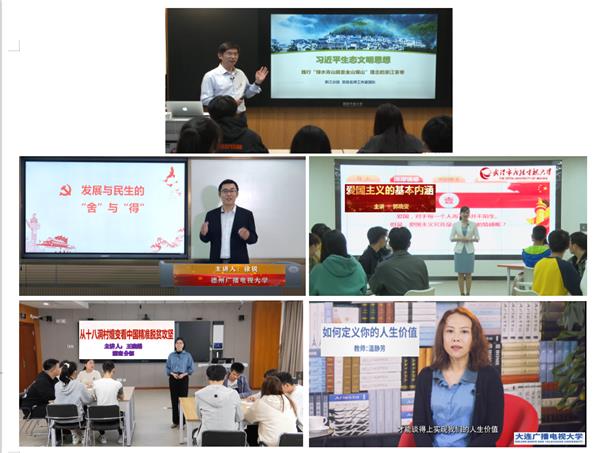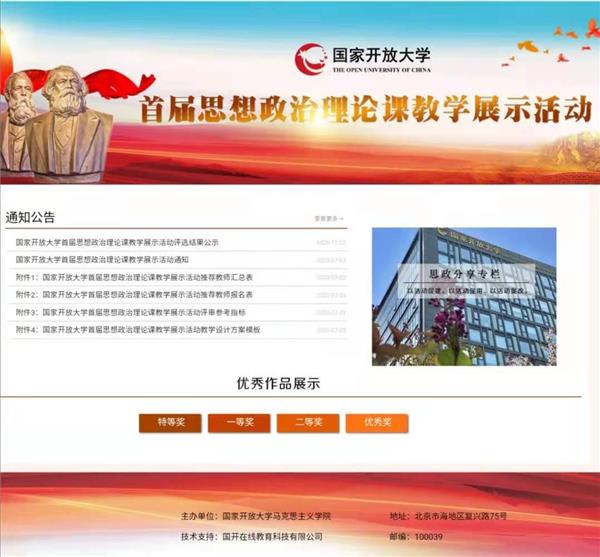 A few days ago, an event to display the teaching in the course Ideological and Political Theory concluded at the School of Marxism of the Open University of China (OUC).
A few days ago, an event to display the teaching in the course Ideological and Political Theory concluded at the School of Marxism of the Open University of China (OUC).
Its purpose was to study and implement "Several Opinions on Deepening Reform and Innovation of Courses in Ideological and Political Theory in the New Era" issued by the general office of the Central Committee of the Communist Party of China and the general office of the State Council, and to implement the plan for "Creating Excellence in Courses in Ideological and Political Theory in Colleges and Universities in the New Era" issued by the Ministry of Education, as well as “Opinions on Deepening Reform and Innovation of Courses in Ideological and Political Theory at the OUC in the New Era”. It also aimed to help teachers present teaching innovations and demonstrate the quality of research and the attractiveness of teaching, so as to promote teaching reform of ideological and political courses and improve teaching quality.

All OUC branches and schools attached great importance to the event, which was launched on July 10 with teachers making preparations, and participating in activities that involved self-evaluation and feedback. A total of 146 works were recommended by 37 branches and schools, and over 370 teachers participated, with 5 special awards, 10 first prizes, 20 second prizes, 25 awards of excellence, and 12 awards for organisations being given.
The judges spoke highly of the event, stating that the teaching activities displayed in a rich manner the unique qualities of the branches and schools. They praised the teaching designs, the focus on reform and innovation, and the cooperation of the teams, which demonstrated the distinctive characteristics of large-scale ideological and political education for adults at the OUC.

First, the works emphasised content, and were based on core socialist values. Demonstrating integrity and innovation, the content was carefully designed to be problem-based, and the connections of and transitions among the different teaching sections were emphasised, highlighting the vitality of Marxist theory. At the same time, it took into account the fact that it was targeting employed adult learners by emphasising interaction, discussion, and the practical aspects of lessons in order to enable students to integrate these easily into their work lives.
Second, systematic coordination, and innovative teaching organisation, were both achieved. The activities demonstrated the strength of the teaching teams, and integrated into teaching the resources of the OUC learning network, theoretical instructions by OUC teachers, and grassroots teaching practices. The resources help students undertake self-directed study and carry out teaching design. Teaching responsibilities at OUC branches are divided among a head teacher and a number of tutors for each class, with the former giving the theoretical overview and the latter dealing with more specific issues. This approach strongly appeals to students.
Third, the teaching on display showed innovative use of teaching technology, combining online and offline instruction as well as theory and practice, with small classes engaged in group discussions offline, and large classes interacting online. Online connections were made to local teaching sites, while teaching was collaborative, and switched among approaches. At the same time, through face-to-face classes broadcast live, students everywhere were able to take part.
Fourth, the work promoted teamwork and transformed roles for teachers. Each OUC branch and school set up a teaching team composed of a teaching designer, a lecturer, and technical-support personnel. Teachers made use of information technology, switched among teaching approaches, learned new skills, and realised that high-quality ideological and political courses are not only achieved through personal teaching abilities, but also the strength of cooperation and professionalism within the teaching teams.
The teaching demonstration modeled positive new approaches to teaching ideological and political courses. It brought together resources with regional advantages and characteristics, and showcased unity and cooperation, mutual learning, and collaborative improvement. It was not only an exhibition and sharing of the teaching experiences of teachers of ideology and politics in the OUC system, but also an in-depth investigation of such teaching, contributing greatly to the cohesion of the teaching teams within the system.
By Xuan Hongqin and Zhang Liyuan, OUC